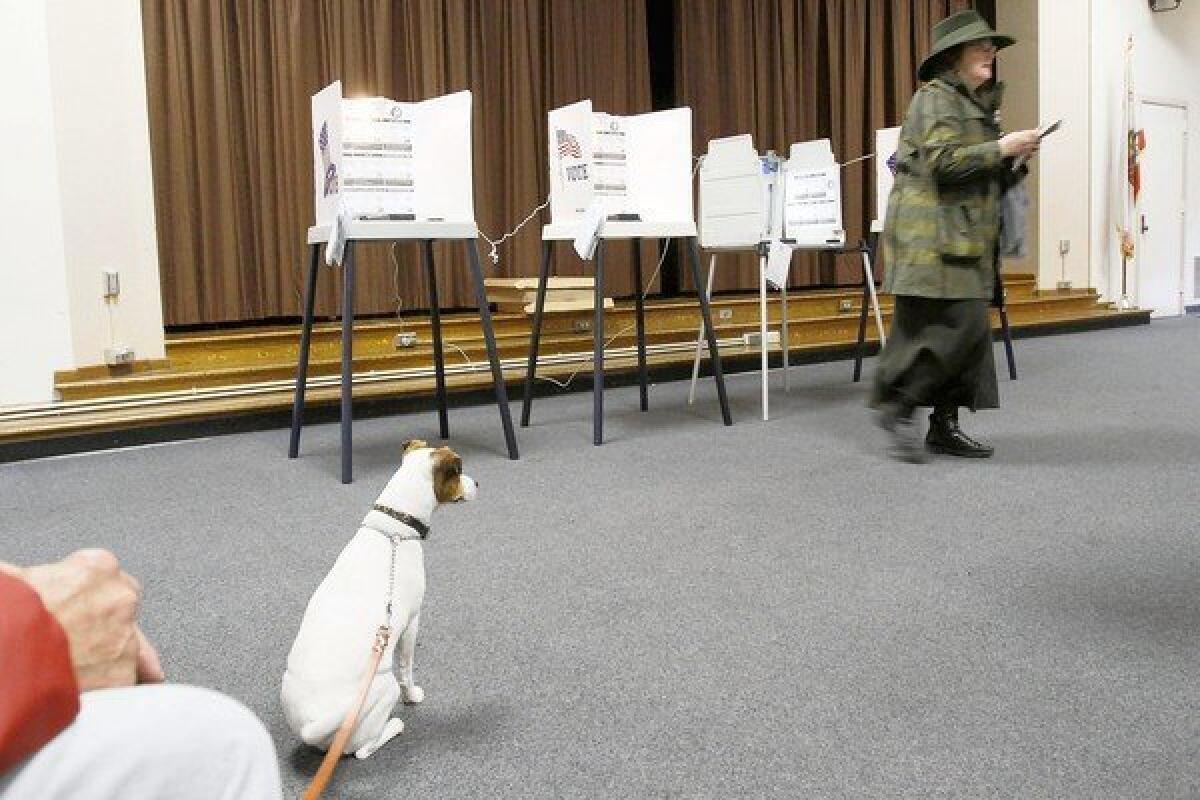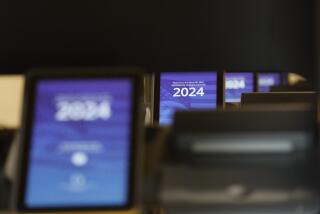Low L.A. voter turnout restarts debate about election scheduling

Los Angeles held an election Tuesday and lots of people didn’t bother showing up. One city leader called the initial turnout figure, just over 16%, “awful” and “embarrassing.” The latest demonstration of electorate disengagement renewed discussions about rescheduling L.A.’s elections to coincide with higher-profile state or national races.
The total voter participation won’t be known until large numbers of mail-in and provisional ballots are counted. According to a Times analysis, that could drive final turnout for the election close to 20%, potentially changing the outcome of some City Council races.
While striking, it is not an unprecedented low turnout for the first round in a Los Angeles municipal election. Four years ago, 17.9% of the city’s 1.6 million registered voters cast ballots. Mayor Tom Bradley’s last reelection bid, in 1989, drew only 23% of eligible voters.
Still, the initial vote totals — about 293,000 of more than 1.8 million registered voters — stood out, given the nearly $19 million spent on behalf of the mayoral candidates alone.
The low voting mark set four years ago was more expected because it came after a virtually ad-free contest, with Mayor Antonio Villaraigosa seeking reelection against a field of virtual unknowns.
Election night tote boards Tuesday showed some politicians closing in on a $178,000-a-year job on the City Council with limited ballot box support. In the 9th District of South Los Angeles, Curren D. Price Jr. and Ana Cubas glided into a May 21 runoff with 2,452 and 2,158 votes, respectively. (Not counting ballots to be totaled later.)
City Council President Herb Wesson decried the showing by voters. He was particularly agitated because of the failure of Measure A, the half-cent sales tax hike he had championed to bolster the city treasury with an estimated $200 million a year.
Moving the election date could save the city some of the $17 million it would spend this year on two elections, but consolidating voting with Los Angeles County would not be easy. It would require a City Charter change and lead to excessively long ballots.
Pro-consolidation advocates argue the city would get more attention in higher-turnout state and national elections. But others fear the opposite: that mayoral and council races would become an afterthought as voters pondered candidates for governor or president.
A 2007 study by a University of Michigan professor found Los Angeles with a median turnout of 26%, compared to 48% in Chicago, 44% in Philadelphia and 41% in San Francisco.
Why does the second-largest city take so little interest in its politics? It appears to be a combination of culture, timing and the structure of local political offices.
The city’s far-flung borders confuse some residents, who don’t necessarily know whether they live in L.A., a neighboring suburb or an unincorporated section of the county. The mayor has an important role, but not nearly as pivotal as in New York, where the chief executive controls not only public safety and other basic services but also schools and social services.
Even in the 2005 election, a watershed contest that elected Antonio Villaraigosa as the first Latino mayor in modern times, only 28.5% of voters turned out in the March primary.
Analysts note that the city’s off-year elections fall just months after voters have been absorbed by presidential voting. They simply can’t engage with another set of politicians, the theory goes, roughly four months after putting someone in the White House.
Finally, L.A. doesn’t conduct partisan races, or feature the ubiquitous organizations that engage citizens in other cities.
“New York and Chicago are partisan cities that have very, very deep political organizations,” said Raphael J. Sonenshein, executive director of the Pat Brown Institute at Cal State Los Angeles. “Los Angeles’ political culture is sometimes hostile to politics and sometimes not involved. It doesn’t mean people are lazy or ignorant. They are just working very hard and interested in other things.”
Despite the millions of dollars spent on ads, many Angelenos said Tuesday’s election simply didn’t capture their attention, or hold it.
“I usually vote when it’s a big one, like the presidential election. It’s peer pressure,” said Jamison Ng, 28, an entrepreneur who lives downtown. But he didn’t even hear about the L.A. election until voting day and then he decided to pass, until the runoff.
The heavy advertising around the mayoral contest didn’t help clarify things for Sheila Martinez, 27. “It was overwhelming,” said Martinez, of Koreatown. “I kept thinking, ‘Wait, is this person good or bad?’ I gave up trying to differentiate who I considered a viable candidate.”
Transplanted Texan Emily Clock said she got confused about the city’s two-step voting and missed the election altogether. “It’s embarrassing,” Clock said, “but I really thought it was in May.”
Times staff writers David Zahniser and Seema Mehta contributed to this report.
More to Read
Sign up for Essential California
The most important California stories and recommendations in your inbox every morning.
You may occasionally receive promotional content from the Los Angeles Times.











